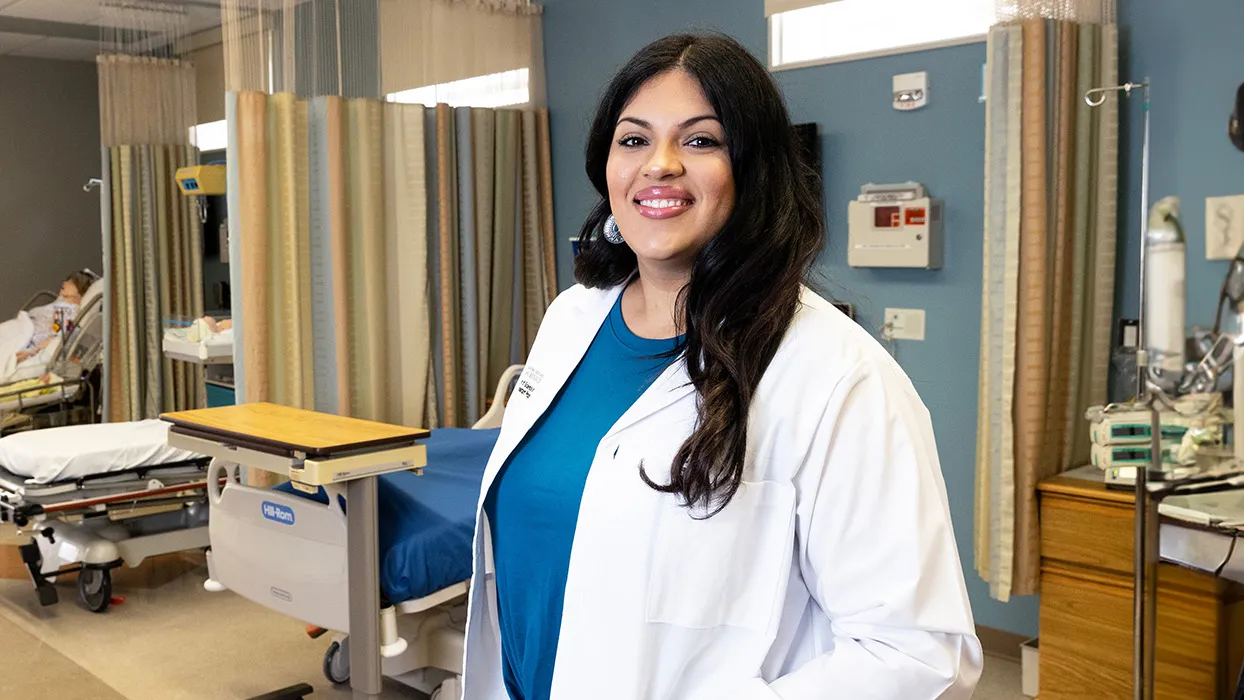Alan Llavore | Office of Strategic Communication | (909) 537-5007 | allavore@csusb.edu

California State University, San Bernardino’s forthcoming Master of Science in Physician Assistant (MSPA) program on April 25 opened its national application (CASPA), running through Dec. 1.
The MSPA program will be accepting applicants annually in a cohort model. Each cohort will travel through the program’s coursework and clinical experiences as a group. The goal for the first cohort will be 40 students.
Dedicated space for the new cohort will be placed in a remodeled building formerly known as the Yasuda Center on campus. The formal groundbreaking for the remodeling took place on April 26. State-of-the-art facilities are important for ensuring that the program’s curriculum can be delivered most effectively.
Sonia V. Otte, MSPA founding program director, was brought on board when the dream of providing such a program was still a gleam in the university’s eye. “I started with crafting a mission and vision and ensured that it aligns with the mission, vision, goals and values of CSUSB and the surrounding community.”
She previously created the MSPA program at the Keck Graduate Institute in Claremont. “This program is special,” she emphasized. “CSUSB’s MSPA program will be unique because it will be responsive to the needs of San Bernardino and the needs of the community.”
One of the primary areas that sets CSUSB’s MSPA program apart is that it will be much more community focused and forward facing. An initial course for each cohort will involve community health and service. This will teach students what the community’s needs are and how to approach patient care with compassion and cultural humility.
There will also be an applied community and behavioral health series as part of the degree. This will allow students to continue their work in the community and learn more about a huge need here in the Inland Empire: behavioral health. As part of this course series, students will have the opportunity to engage in early clinical experiences. They will be able to directly apply their classroom learning into the real world.
There are two components to the program: didactic (primarily classroom) and clinical. “Once I started developing the mission and vision,” Otte said, “I next focused on active and innovative learning in the classroom. This required a re-envisioning of the physical classroom and the lab spaces to accommodate that approach.”
While the didactic portion typically takes place over the first 15 months of the program, the addition of clinical experience as part of the early coursework is unique to CSUSB’s approach.
Another element unique to CSUSB’s MSPA program is integrating telemedicine into the patient assessment and communication course. In underserved areas, such as the IE, there are more opportunities for hybrid positions which enable a greater number of night-time and weekend appointments, without burning out providers by excessive time on the road.
For example, students will learn how to perform a cardiac exam both in-person and via telemedicine.
“I see the hybrid model as becoming more common,” observed Otte. “I wanted our students to be prepared for that type of work immediately upon graduation, beginning with our first class, which will be graduating in 2027.”
The eventual goal is to expand the cohort to 50 students, but gradually and over time. The revamped facilities will be designed to accommodate that eventual 50 number. “My hope is to remain at 40 until we have gone through our provisional accreditation process before we start expanding,” Otte stated.
CSUSB’s MSPA application process will be very intentional in aiming to retain its graduates here in the IE. “While the program is open to people across the U.S. and internationally, our goal is to have our graduates stay and serve in this area.” Admissions requirements can be found on MSPA Requirements webpage.
“Our approach is holistic,” explained Otte. This means that the program does not require standardized tests. Furthermore, preference is given if an applicant: was raised or spent the majority of their childhood here in the IE or in another medically underserved area as determined by HRSA; has clinical experience in the IE or another underserved area; is a CSUSB graduate; has fluency in Spanish; and/or is a first-generation student (that is, the first in their family to attain a college degree).
“Our goal is to assemble cohorts which resemble the community they will be serving here in the IE,” she concluded.
The other highly qualified founding faculty and staff in the program can be found on the MSPA Faculty and Staff webpage.
For more information, visit the Master of Science in Physician Assistant program website.
Accreditation Status of MSPA Program
CSUSB has applied for Accreditation-Provisional from the Accreditation Review Commission on Education for the Physician Assistant (ARC-PA). The university anticipates matriculating its first class in August 2025, pending achieving Accreditation-Provisional status at the March 2025 ARC-PA meeting.
Accreditation-Provisional is an accreditation status granted when the plans and resource allocation, if fully implemented as planned, of a proposed program that has not yet enrolled students appear to demonstrate the program’s ability to meet the ARC-PA Standards. Accreditation-Provisional status is also granted when a proposed program appears to demonstrate continued progress in complying with the ARC-PA Standards as it prepares for the graduation of the first class (cohort) of students. In the event the program does not earn accreditation-provisional status, students will not matriculate, and admissions deposits will be refunded. CSUSB is fully accredited by the WASC Senior College and University Commission (WSCUC).